To work effectively across cultural differences, you should develop cultural competence as an ongoing process. This involves self-awareness, understanding clients’ values, and adapting your communication carefully. Building trust through empathy and respect helps improve treatment outcomes and client engagement. You’ll learn how to refine your skills and approaches, foster inclusivity, and navigate challenges. Continuing to explore these best practices will enhance your ability to serve diverse clients effectively.
Key Takeaways
- Developing self-awareness and understanding clients’ cultural backgrounds enhances trust and tailored therapeutic interventions.
- Ongoing education and active learning foster cultural humility and responsiveness in diverse client situations.
- Demonstrating empathy, respect, and open communication helps bridge cultural differences and strengthens the therapeutic alliance.
- Organizational policies and training promote inclusive practices that support effective cross-cultural therapy.
- Recognizing and addressing biases and stereotypes ensures culturally sensitive, ethical, and effective mental health care.
Understanding the Foundations of Cultural Competence in Therapy
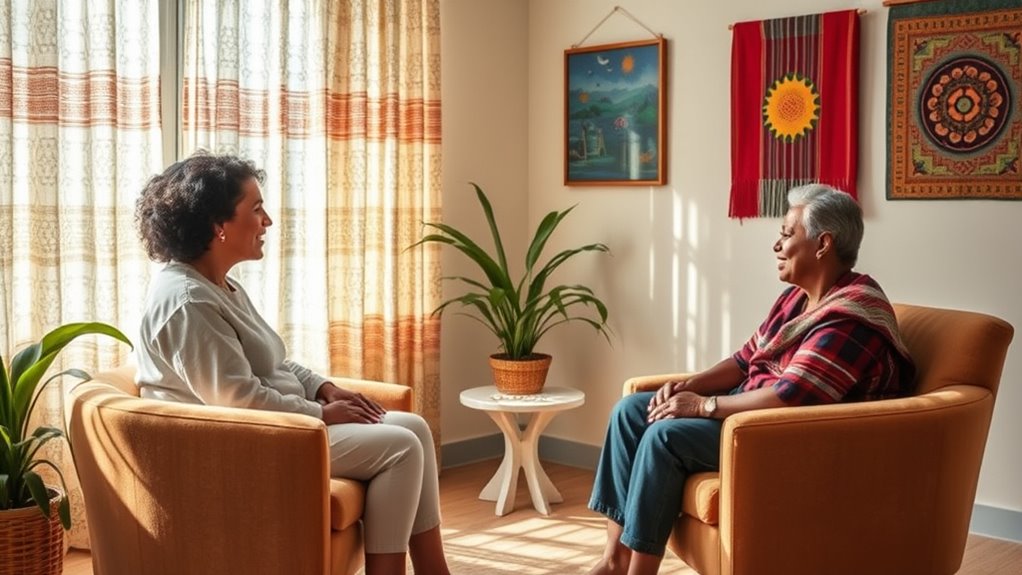
Understanding the foundations of cultural competence in therapy begins with recognizing that it is more than just awareness; it involves actively developing the skills and attitudes necessary to work effectively with clients from diverse cultural backgrounds. You need to understand and respect different values, beliefs, and communication styles, adapting your approach accordingly. Cultural competence isn’t a one-time achievement but a continuous process of self-assessment, learning, and growth. It includes recognizing your own biases and assumptions to prevent them from interfering with therapy. Building this competence requires you to stay open, empathetic, and curious about your clients’ cultural experiences. For example, understanding the importance of home environment factors can significantly enhance your ability to connect with clients. By doing so, you create a safe, respectful environment that fosters trust and enhances treatment effectiveness across cultural boundaries.
The Impact of Cultural Awareness on Treatment Outcomes
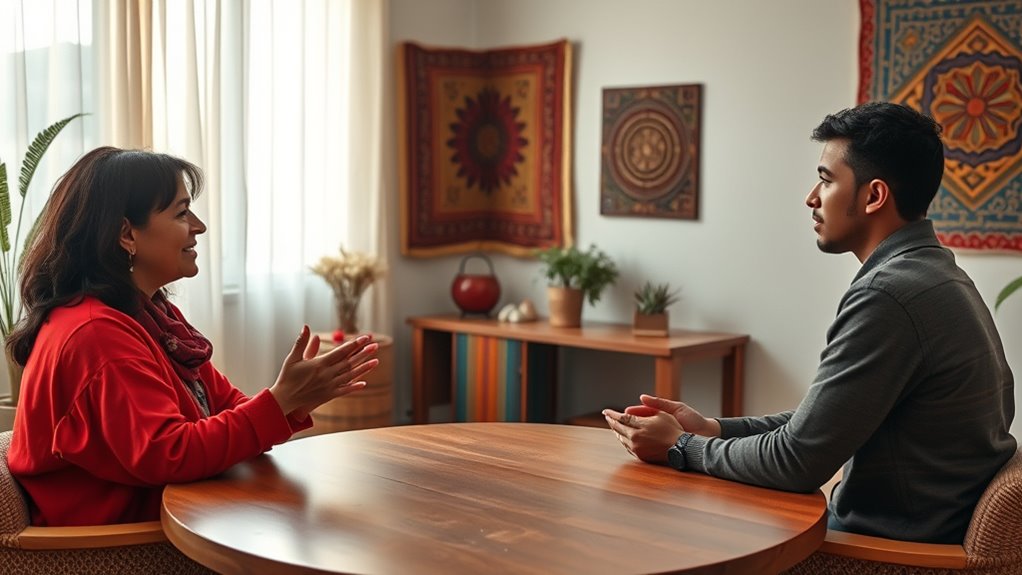
When you understand your clients’ cultural backgrounds, you can build stronger therapeutic alliances that foster trust and openness. This awareness allows you to tailor interventions that resonate more deeply, increasing their effectiveness. Ultimately, reducing cultural misunderstandings helps improve treatment outcomes and promotes better mental health for diverse clients. Incorporating cultural awareness into your practice can also help prevent miscommunications that may hinder progress.
Enhanced Therapeutic Alliance
Cultural awareness plays a crucial role in strengthening the therapeutic alliance, which is a key predictor of positive treatment outcomes. When you understand and respect your clients’ cultural backgrounds, you create a safe, trusting environment that encourages openness. Recognizing cultural values, communication styles, and beliefs helps you connect more authentically, making clients feel understood and valued. This rapport fosters engagement, motivation, and commitment to therapy. By demonstrating cultural sensitivity, you reduce misunderstandings and build a foundation of mutual respect. As a result, clients are more likely to share their true experiences and collaborate actively. Incorporating culturally sensitive techniques into your practice further enhances connection and trust. Ultimately, a strong, culturally attuned alliance enhances the effectiveness of your interventions and supports sustained progress. This approach ensures your clients feel seen, heard, and supported in their unique cultural context.
Tailored Interventions Effectiveness
Have you ever considered how tailoring interventions to a client’s cultural background enhances therapy outcomes? When you adapt treatments to align with cultural values, beliefs, and communication styles, you increase relevance and engagement. Culturally tailored interventions foster trust and understanding, which can lead to better symptom reduction and increased adherence. Recognizing these differences allows you to select appropriate techniques that resonate with clients’ lived experiences. Incorporating culturally sensitive approaches, such as understanding diverse communication styles and social norms, further improves treatment effectiveness.
Reduced Cultural Misunderstandings
Tailoring interventions to a client’s cultural background not only improves engagement but also reduces the likelihood of misunderstandings during therapy. When you understand your client’s values, communication styles, and cultural norms, you can interpret their responses more accurately. This awareness helps you avoid misreading behaviors or emotional expressions that may be culturally specific, preventing unnecessary confusion or misdiagnosis. By respecting cultural differences, you foster trust and clarify expectations, making it easier to address sensitive issues. As a result, clients feel more understood and comfortable sharing their true thoughts and feelings. Improved understanding minimizes potential conflicts or misinterpretations that can hinder progress. Recognizing zodiac sign compatibility and cultural beliefs about relationships can also provide valuable context for clients’ perspectives. Ultimately, reducing misunderstandings through cultural awareness enhances treatment effectiveness and helps build a stronger, more collaborative therapeutic relationship.
Essential Skills for Culturally Responsive Practice

What are the key skills that enable therapists to practice in a way that genuinely respects and responds to clients’ cultural backgrounds? First, you need self-awareness—recognize your own biases, assumptions, and cultural lens. This helps prevent ethnocentrism and promotes genuine openness. Next, develop cultural knowledge by understanding your clients’ values, traditions, and communication styles to inform assessment and intervention. Adapt your techniques thoughtfully, ensuring they align with clients’ cultural contexts. Demonstrate empathy and respect through active listening and validation. Additionally, understanding Honda Tuning concepts can highlight the importance of precise adjustments and customization when working across diverse cultural backgrounds. Finally, stay committed to ongoing learning, seeking education and feedback to refine your skills continually. These competencies foster trust, improve engagement, and empower clients to feel seen and understood within their cultural realities. Mastering them creates a foundation for effective, culturally responsive therapy.
Approaches to Effective Cross-Cultural Communication
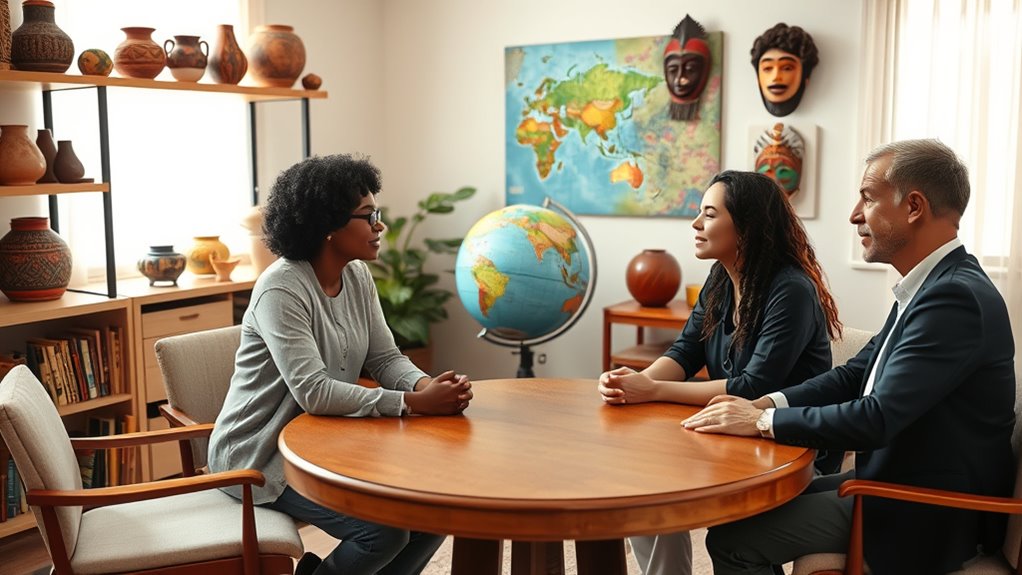
Effective cross-cultural communication is essential for building trust and understanding in therapy with clients from diverse backgrounds. To do this, start by actively listening and demonstrating genuine curiosity about their cultural perspective. Use open-ended questions to encourage clients to share their experiences and values without judgment. Be mindful of nonverbal cues, such as gestures or eye contact, which may vary across cultures. Practice cultural humility by acknowledging what you don’t know and asking for clarification when needed. Adapt your language and explanations to guarantee clarity and avoid misunderstandings. Show respect by validating their worldview and avoiding assumptions or stereotypes. By fostering an environment of openness and respect, you enable more meaningful dialogue and stronger therapeutic alliances across cultural differences. Incorporating cultural competence into your approach can further enhance your effectiveness in working across diverse populations.
Training Strategies to Enhance Cultural Competence Among Therapists
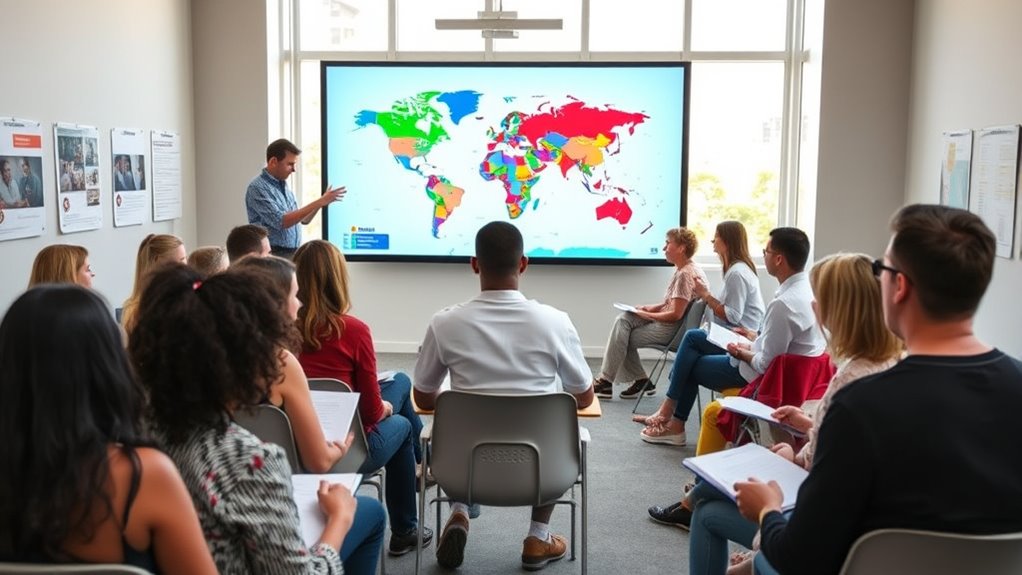
Training strategies to enhance cultural competence among therapists are essential for ensuring meaningful skill development and improved client outcomes. Active learning methods, such as role-playing, case studies, and supervised clinical practice, foster practical skills and cultural responsiveness. Incorporating diverse cultural topics—religion, immigration, socioeconomic factors—broadens understanding. Ongoing education, self-assessment, and feedback are critical for growth. Use the table below to understand key elements:
| Strategy | Purpose |
|---|---|
| Active learning | Develops practical cross-cultural skills |
| Cultural immersion | Deepens understanding of diverse backgrounds |
| Reflection and self-assessment | Identifies biases, promotes growth |
| Supervised practice | Applies knowledge in real-world scenarios |
| Continuous education | Keeps skills current with evolving cultural dynamics |
Additionally, engaging in lifestyle practices that promote personal awareness can enhance therapists’ ability to work effectively across cultural differences.
Organizational Roles in Promoting Cultural Sensitivity and Equity

Organizational roles are crucial in fostering cultural sensitivity and equity within mental health services. Your organization can create a culture that values diversity through intentional policies, ongoing staff training, and inclusive practices. You can:
- Implement policies that prioritize diversity and inclusion, ensuring equitable access for all clients.
- Provide continuous cultural competence training for staff, promoting awareness and skill development.
- Establish accountability measures to monitor progress and address disparities effectively.
- Promoting cultural competence as a core organizational value helps ensure that services are responsive to the diverse needs of clients.
These actions help build trust, reduce biases, and promote a safe environment where clients feel understood and respected. When your organization actively champions cultural sensitivity, it transforms services into equitable, healing spaces—empowering both clients and therapists alike. Organizational commitment is essential for lasting change and social justice in mental health care.
Addressing Challenges and Moving Forward in Cross-Cultural Therapy
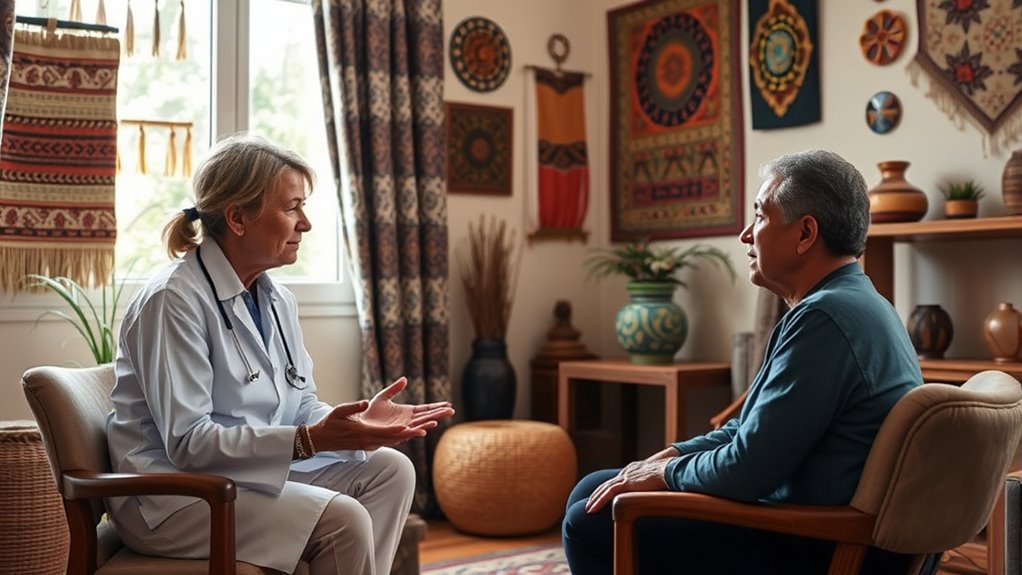
While fostering cultural sensitivity within organizations sets a strong foundation, practitioners still face significant challenges when applying cross-cultural therapy in real-world settings. You must navigate complex cultural dynamics, avoid stereotypes, and maintain cultural humility. Balancing respect for clients’ traditions with evidence-based practices can be difficult, especially when cultural values clash with therapeutic models. Additionally, limited training on diverse cultural factors like religion or socioeconomic status hampers your effectiveness. Moving forward, you should prioritize ongoing education, actively seek supervision, and incorporate client feedback. Developing flexible, culturally responsive techniques and advocating for systemic change are essential to overcoming barriers. Embracing these efforts guarantees you provide more equitable, respectful, and effective care, fostering genuine trust and positive outcomes across cultural boundaries. Recognizing the importance of cultural competence can help deepen your understanding and improve your therapeutic approach.
Frequently Asked Questions
How Can Therapists Measure Their Own Cultural Competence Effectively?
You can measure your cultural competence effectively by engaging in self-assessment tools, reflecting on your biases, and seeking feedback from clients. Use standardized questionnaires or scales that evaluate your knowledge, skills, and attitudes toward diverse populations. Additionally, monitor your ability to adapt therapy techniques and build rapport across cultural differences. Regularly participating in training and supervision helps track your growth and highlights areas for improvement.
What Are Common Barriers Clients Face in Culturally Adapted Therapy?
Think of clients steering a maze filled with cultural barriers. You might find language differences, mistrust, or unfamiliar therapy concepts blocking progress. Clients may also fear judgment or stereotyping, making it hard to open up. Socioeconomic challenges, stigma, and previous negative experiences further complicate their journey. Recognizing these obstacles helps you tailor your approach, ensuring you create a safe, respectful space where clients feel understood and empowered to move forward.
How Does Cultural Competence Influence Therapeutic Boundaries and Ethics?
Cultural competence helps you maintain clear boundaries and uphold ethical standards by ensuring you respect clients’ cultural values while avoiding overstepping or stereotyping. You become more aware of cultural nuances that influence boundaries, communication, and decision-making. This awareness guides you to adapt your approach ethically, foster trust, and prevent boundary violations, ultimately promoting a safe, respectful space where clients feel understood and protected within their cultural context.
What Role Does Client Feedback Play in Developing Cultural Responsiveness?
You play a crucial role in developing cultural responsiveness by actively seeking and valuing client feedback. When you listen carefully to their experiences and perspectives, you gain insights into their cultural needs and preferences. This ongoing feedback helps you adapt your approach, ensuring your therapy respects their cultural background. By integrating their input, you build trust, improve engagement, and enhance the overall effectiveness of your culturally responsive practice.
How Can Organizations Sustain Long-Term Cultural Competence Initiatives?
You can sustain long-term cultural competence initiatives by embedding them into your organization’s core policies and practices, ensuring ongoing staff training, and fostering a culture of continuous learning. While some may worry about resource constraints, integrating cultural competence into existing workflows makes it manageable. Regularly assess progress through feedback and data, adapt strategies as needed, and promote leadership buy-in to maintain momentum and demonstrate commitment across all levels.
Conclusion
By embracing cultural competence, you open doors to understanding, respect, and connection. By listening deeply, learning continuously, and acting intentionally, you create safe spaces for growth. By valuing differences, honoring experiences, and challenging biases, you foster trust and healing. Your commitment transforms therapy into a truly inclusive journey—where every individual feels seen, heard, and valued. Together, you and your clients can build bridges, break barriers, and inspire change.









